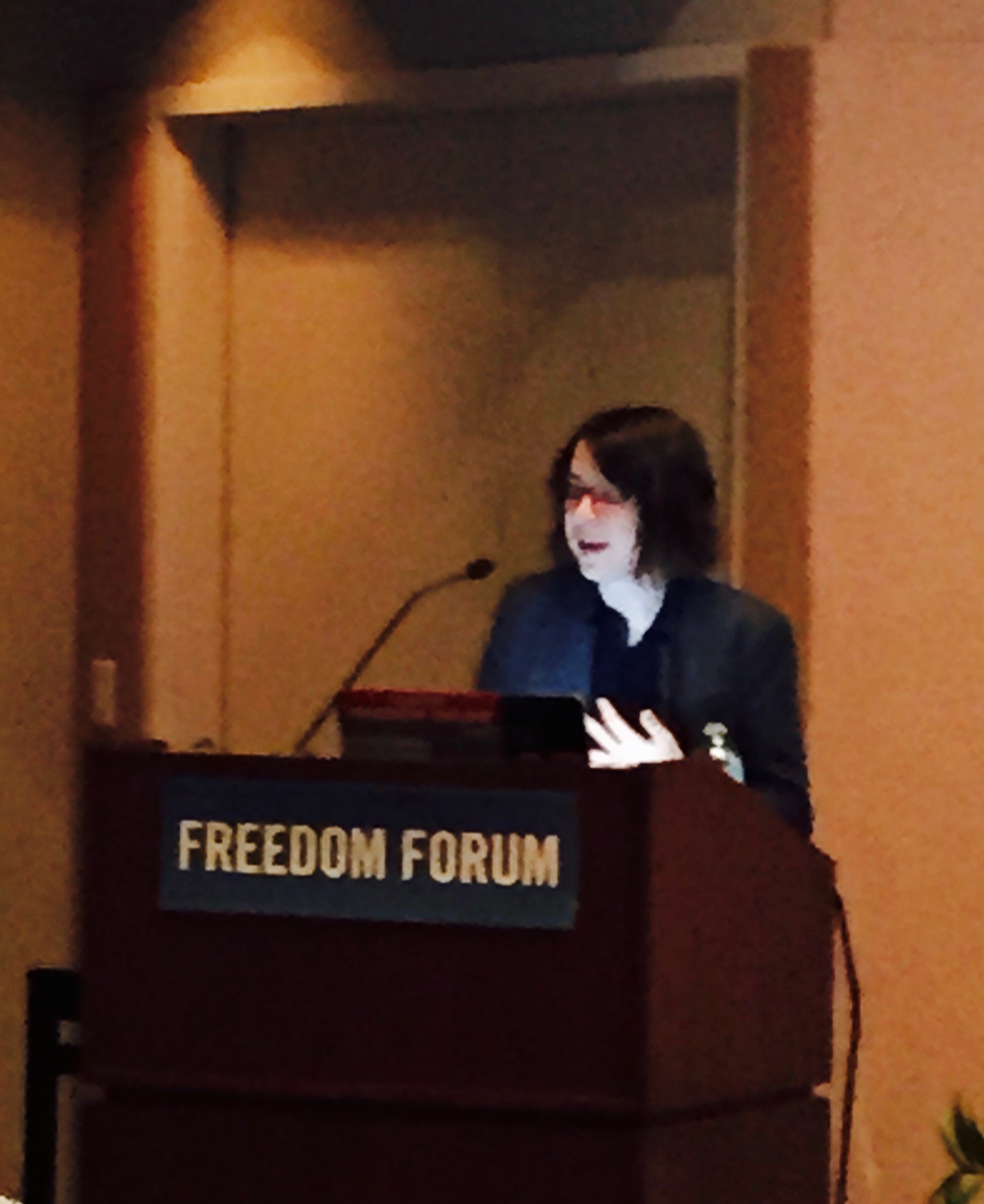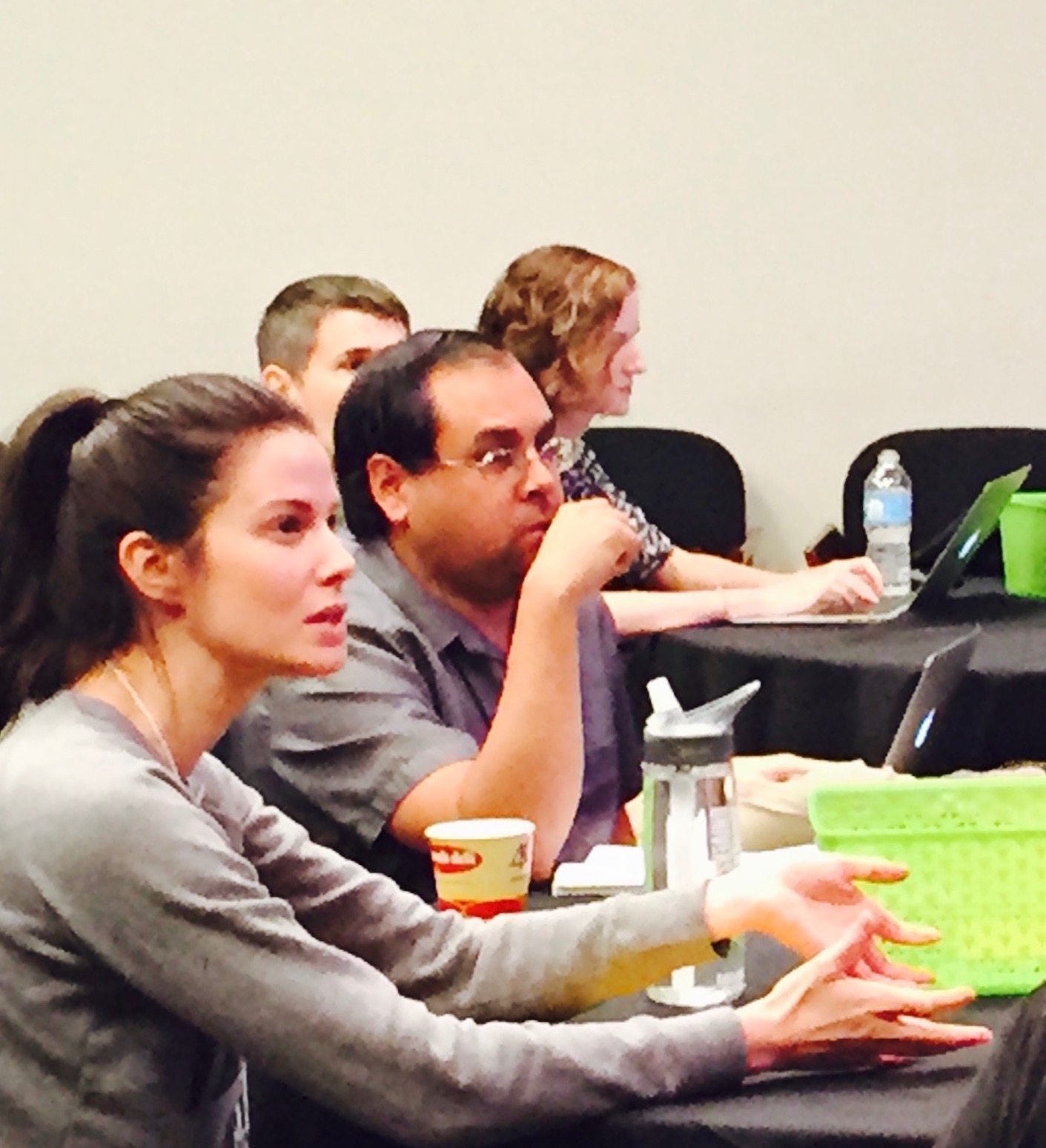Laura Hagele-Strömbergsson: Vanderbilt 2016 THAT Camp
Every year, the Vanderbilt digital humanities community looks forward to fall not just because of the promise of slightly cooler weather, but also because of our annual THAT Camp. Short for “The Humanities and Technology”, this two-day un-conference for digital humanists across the Vanderbilt campus provides a wonderful opportunity to come together and learn as a community. Aside from getting to spend time with fellow DH-ers that you may not have seen for a while, THAT Camp is also the perfect place to begin your foray into the digital humanities if you are new to campus or new to DH.
On Friday October 28th, we met at 4:30pm for our kick-off session in which DH-ers informally presented their projects and interests to a crowd of their peers. These mini-presentations are called “Dork Shorts” and are usually about 2 minutes in length. This year we had quite a few of them, with DH-ers presenting interests from gaming to podcasts to digital pedagogy. By the end of these productive sessions, we voted on and put together a schedule of Saturday workshops based on the interests of the crowd. This year the schedule encompassed a huge variety of topics like “Defining Data Collection,” “Twitterbots,” and “Sustainability.” For a more complete schedule, please visit http://vanderbiltuniversity2016.thatcamp.org.
 The next morning I had the privilege of picking up our keynote speaker, Amanda Visconti. An avid digital humanist whose digital dissertation “Infinite Ulysses” rethinks how to look at public engagement, Dr. Visconti spoke compellingly about the current state of the digital humanities and called for humanists to engage in what she called “co-working with an already interested scholarly public.” She argued that our role as humanists is not just to make the public “see the value” of the humanities, but that we should strive to improve access of the public to these conversations that normally remain locked behind the ivory tower of academia. If humanists are serious about using DH to make the humanities more open, then we need to start designing for public use. Dr. Visconti even gave some examples of how she tries to do this through her own dissertation, for which she designed and built an interactive version of James Joyce’s Ulysses. She mentioned that she created the site specifically with the goal of getting readers outside of academia to read, try to understand, and engage with the text on their own terms. Dr. Visconti emphasized that the reasoning behind this decision had to do with the fact that she saw “a hunger for deep learning about our cultural heritage and that is often hard for the public to do without connections to academia.” It was inspiring to hear from someone who had established a process based on a reciprocal relationship with the public and valued the contributions of the public, rather than the traditional method of asking what the academy can do for the public. I think we all left the hour-long keynote feeling more motivated and confident to see through a similar change in our own work. I was reminded of the interesting work in my own field by Vanderbilt Center for Teaching Assistant Director Vivian Finch, who devised a project that used Twitter in her undergraduate German classroom. The way that this project involved the German public in the conversations with German learners really showed how this could be accomplished within my own field of language teaching.
The next morning I had the privilege of picking up our keynote speaker, Amanda Visconti. An avid digital humanist whose digital dissertation “Infinite Ulysses” rethinks how to look at public engagement, Dr. Visconti spoke compellingly about the current state of the digital humanities and called for humanists to engage in what she called “co-working with an already interested scholarly public.” She argued that our role as humanists is not just to make the public “see the value” of the humanities, but that we should strive to improve access of the public to these conversations that normally remain locked behind the ivory tower of academia. If humanists are serious about using DH to make the humanities more open, then we need to start designing for public use. Dr. Visconti even gave some examples of how she tries to do this through her own dissertation, for which she designed and built an interactive version of James Joyce’s Ulysses. She mentioned that she created the site specifically with the goal of getting readers outside of academia to read, try to understand, and engage with the text on their own terms. Dr. Visconti emphasized that the reasoning behind this decision had to do with the fact that she saw “a hunger for deep learning about our cultural heritage and that is often hard for the public to do without connections to academia.” It was inspiring to hear from someone who had established a process based on a reciprocal relationship with the public and valued the contributions of the public, rather than the traditional method of asking what the academy can do for the public. I think we all left the hour-long keynote feeling more motivated and confident to see through a similar change in our own work. I was reminded of the interesting work in my own field by Vanderbilt Center for Teaching Assistant Director Vivian Finch, who devised a project that used Twitter in her undergraduate German classroom. The way that this project involved the German public in the conversations with German learners really showed how this could be accomplished within my own field of language teaching.
 Following Dr. Visconti’s keynote, the DH community began to breakup into our individual working sessions. I chose to attend the session about “Marketing Yourself as a Digital Humanist,” which was enlightening and gave me a lot of good things to think about for the future and the various career paths I might consider. I was especially surprised by the number of areas one could display their work outside of a traditional resume: personal websites, Github, and the HASTAC site. For a more complete record of this discussion and of the topics covered within it, please visit http://vanderbiltuniversity2016.thatcamp.org and look under the title “Marketing as a Digital Humanist.”
Following Dr. Visconti’s keynote, the DH community began to breakup into our individual working sessions. I chose to attend the session about “Marketing Yourself as a Digital Humanist,” which was enlightening and gave me a lot of good things to think about for the future and the various career paths I might consider. I was especially surprised by the number of areas one could display their work outside of a traditional resume: personal websites, Github, and the HASTAC site. For a more complete record of this discussion and of the topics covered within it, please visit http://vanderbiltuniversity2016.thatcamp.org and look under the title “Marketing as a Digital Humanist.”
Overall, this year’s THAT Camp provided numerous fun opportunities for learning about and getting to know people active in the digital humanities on campus. If you are interested, please do check it out next year!